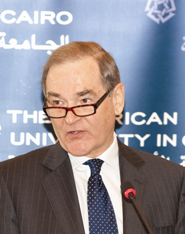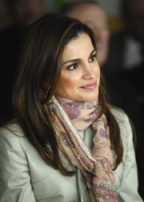Greenstock Delivers First Nadia Younes Memorial Lecture on New Cairo Campus
 Jeremy Greenstock, former British ambassador to the United Nations and special envoy for Iraq
from 2003 to 2004, argued that the U.S.-led war on Iraq illustrates the importance of justice,
legitimacy and the interests of the people in solving the issues of Iran,Afghanistan and Palestine. “I sometimes wonder if lessons are ever learned by anyone other than academics or theorists,” he
said.“Are we prepared yet in Afghanistan to put the people first or to understand the limited shelf
life of a foreign presence? Will the decision makers who matter understand that violence is not the answer in or for Iran? … Above all perhaps, for this region, a future still has to be shaped out of the violence in Palestine. In my view, the recent attack
on Gaza has achieved nothing for the longer term.”
Jeremy Greenstock, former British ambassador to the United Nations and special envoy for Iraq
from 2003 to 2004, argued that the U.S.-led war on Iraq illustrates the importance of justice,
legitimacy and the interests of the people in solving the issues of Iran,Afghanistan and Palestine. “I sometimes wonder if lessons are ever learned by anyone other than academics or theorists,” he
said.“Are we prepared yet in Afghanistan to put the people first or to understand the limited shelf
life of a foreign presence? Will the decision makers who matter understand that violence is not the answer in or for Iran? … Above all perhaps, for this region, a future still has to be shaped out of the violence in Palestine. In my view, the recent attack
on Gaza has achieved nothing for the longer term.”
Greenstock spoke on campus as part of the Nadia Younes Memorial Lecture series, dedicated to the UN administrator who
died in the August 2003 bombing of the UN headquarters in Iraq.The Younes family and friends established a memorial
fund at AUC that –– in addition to the annual lecture –– includes an MUN/MAL conference room on the university
campus and an award for public and humanitarian service for graduating seniors. Greenstock’s lecture, titled “Lessons from
Iraq,” coincided with the official inauguration of the New Cairo Campus and the Nadia Younes Conference Room.
Greenstock highlighted several important lessons learned from the experience in Iraq.These are the need for legitimacy,
clarity of mission and unity of command; the importance of consolidating sufficient resources; understanding the limits of
military power; organizing for a strong political leadership to take over after the war; and dealing effectively with security
issues.“The post-invasion vacuum [in Iraq] was lethal,” he said.“It is the natural rule for democracy, anywhere, that the people
have to have order before they have choice. Civil law and order, border security, guarding of huge ammunition dumps, firm
local administration –– none of these things were thought about or planned for in the early days of the CPA [Coalition
Provisional Authority].”
With the planned withdrawal of U.S. troops from Iraq by mid 2010, Greenstock noted that Middle Eastern countries need
to play an active role in helping war-torn Iraq stand on its feet.“If the American presence has by then run out of shelf life,
both in Iraq and the United States, then the region must take up responsibility for helping Iraq through to the next stage of
stabilization, and I hope that Egypt –– always conscious of its leadership role in the Middle East –– will be able to help bring
that concept forward,” he said.
Academic Programs Receive International Recognition
AUC’s construction and mechanical engineering programs passed a rigorous international reaccreditation evaluation and
will receive full-term accreditation in September 2009, when their current accreditation period expires.The evaluation
team from ABET, one of the leading accreditation organizations worldwide, reported that there were no deficiencies,
weaknesses or concerns.“The ABET board makes its formal decision on accreditation/reaccreditation in July of each year,”
said Medhat Haroun, dean of the sciences and engineering school.“Normally, the time from the visit up to the following June
is left for universities to remedy any noted deficiencies and weaknesses, and to address any concerns, in an attempt to comply
with ABET accreditation criteria.We do not have to do any of that.”
In addition, the management department was named the best business program in Egypt and among the top three in Africa
at the 2008 Eduniversal World Convention. It received the five Palmes award for its role as a business school with major
international influence.The rankings and award were decided by 1,000 business school deans from around the world, as well
as a representative from the Academic Council of the United Nations.
 Queen Rania Wins YouTube Award
Queen Rania Wins YouTube Award
Her Majesty Queen Rania Al-Abdullah ’91
recently won YouTube’s first ever Visionary
Award. Presented as part of the official launch of
YouTube Live, the award celebrates active users of
YouTube who aim to use the service as an open
platform for constructive dialogue to highlight social
and cultural issues, working for positive change in
their communities and around the world. Her
YouTube channel, www.youtube.com/queenrania,
which is dedicated to breaking down stereotypes
about the Arab and Muslim worlds and bridging the
East-West divide, has more than 15,000 subscribers and has been viewed more
than half a million times since its launch in March 2008.
“YouTube encourages us to be active participants in a global conversation,
making our voices heard, giving us the power to broadcast ourselves, increasing
knowledge of each other, breaking down the barriers between us clip by clip,” said Queen Rania in an official statement.
Chad Hurley, co-founder of the popular Internet video-sharing Web site, honored her efforts with the award during a 90-minute live event on the site. “Queen Rania sets the standard for breaking down stereotypes, and her
YouTube videos are nothing short of inspirational,” said Hurley. “It is both a
pleasure and an honor to present her with this much-deserved tribute.”
El-Khazindar Center Documents Business Case Studies
El-Khazindar Business Research
and Case Center was recently
established at AUC to develop and
publish case studies on companies
operating in the Middle East and
North Africa.
Founded by Hisham El-Khazindar
’96,Ahmed Tolba ’97, ’01, assistant
professor of marketing and the
center’s director, and Eskandar Tooma
’98, associate professor of finance, the
center’s vision is to become the
leading case development center in
the Middle East and the primary link
between academic research and
practical applications.“The aim is to
provide students in the region with
top-quality, relevant and up-to-date
business cases that improve their
learning experience and enrich their
applied knowledge,” explained Tolba.
The center aims to apply
classroom concepts and theories to
the local market of each developing
country. As the center’s activities
grow, it will host conferences as a
venue to present business cases and
discuss current management issues
in the region. It will also hold
seminars to train faculty members in
case development and usage in the
classroom. In addition, there will be
workshops for students to
familiarize them with case analysis
and networking opportunities with
leading practitioners.
Former Sociology Professor Passes Away
Mark C. Kennedy, professor
emeritus of sociology, died
of heart failure in December 2008 at
his home in Lancaster, Pennsylvania.
An AUC professor for 21 years,
Kennedy was an anchor of the
sociology unit and served as
department chair for many years.
After witnessing combat during
World War II, Kennedy attended the
University of Texas at Austin, where
he received a bachelor’s in 1951 and
a master’s in 1953. After working in
the Texas oil fields, he completed his
doctorate at the State University of
New York at Buffalo. He taught
there and at the University of
Vermont before joining AUC in
1969. He was instrumental in the
establishment of the university’s
flagship journal in the social
sciences, Cairo Papers in Social Science
in 1977, of which he was the
founding editor.
AUC Expands Regional Scholarship Opportunities
Three students from Palestine and two students from
Yemen have been awarded full scholarships at
AUC as part of the newly launched Tomorrow’s Leaders
Scholarship Program.
Initiated and co-funded by the U.S. State Department’s
Middle East Partnership Initiative, the program expands
AUC’s scholarship offerings in the region, providing
opportunities to deserving students who excel
academically and display the potential to become future
leaders in the region.
A total of 16 students over three years will be selected
from the Middle East and North Africa, based on their
academic excellence, leadership potential and proven
track record in community service and volunteer work.
In addition to their academic studies at AUC, students
in the program will develop their leadership skills and
become involved in civic engagement and volunteer
work with the goal of becoming community, business
and national leaders of the future.
AUC currently provides scholarships to students in the
region through several other scholarship funds, including
the Palestinian Scholarship Fund awarded to
undergraduate Palestinian students from the West Bank
and Gaza Strip, and a program named after AUC alumna
Queen Rania Al-Abdullah ’91, which provides
scholarships to female students from Jordan.
For more information on how to support scholarships
at AUC, visit www.aucegypt.edu/giving/supportstudy.
Largest Employment Fair Held at New Cairo Campus
AUC’s 44th employment fair was the first one held at the New Cairo Campus, and fittingly, the largest in thehistory of the university. Comprised of 150 companies offering more than 1,700 professional positions, the fair
offered the largest variety of career fields in its history, running the gamut from accounting and biotechnology to insurance, electronics and telecommunication.These opportunities attracted a turnout of more than 1,800 senior students and alumni.
Maha Fakhry, director of recruitment services at the Career Advising and Placement Services office, noted that the spacious design of the New Cairo Campus helped make the fair more organized. “The layout was very smooth, and the floor plan was easier to follow and more convenient in terms of distribution due to the availability of space,” she said.“Everything was well coordinated and organized, from pre-registration to organization, arrangement, layout, opening reception and the campus tours.”
Employers were also impressed with the size of the fair. “This year, the fair was much bigger in terms of the number of participating companies, applicants and venue preparation,” said Ihab Rizk from Citadel Capital, which has been participating in AUC’s employment fairs since 2005.“We believe that with this fair held at the new campus –– being the first interaction between the AUC alumni community and the new campus –– it made history, and we wanted to be part of that.”
Emphasizing why his company keeps returning to hire AUC graduates year after year, Rizk noted,“We recruit from AUC simply because it remains the first-class institution in its league in Egypt, if not the entire Middle East.”